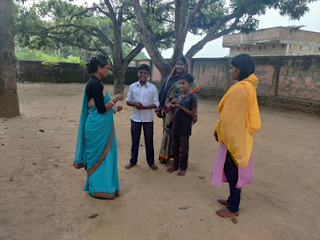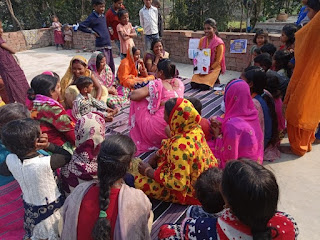The Manager of Home and Panchayati Samiti
An army personnel’s wife, a mother, a teacher, and an edu-leader
-Reena easily juggles all these roles. She is a native of village Nariyana in
Jamui district, Bihar. Along with her fellowship, she has been a member of the
Panchayat Samiti of her village since 2017. She has three children and her
eldest daughter is studying in class 5.
Panchayat
Samiti’s important functions are agriculture, land improvement, watershed
development, social and farm forestry, and technical and vocational
education. As part of her role, Reena has to visit block offices, solve
the community’s problems and help in the implementation of public policies. The
reason she joined this fellowship was that the cause is very close to her
heart. She shared that she always wanted to be a teacher – she even has a B.Ed.
degree. The fellowship sessions, particularly the learning circle session, gave
her theoretical knowledge of government schemes like MGNREGA, Pradhan Mantri
Indira Awas Yojana, filling the forms for AADHAR card and other government
schemes. She thanks her family and in-laws for providing the required support
to pursue this intense two-year fellowship.
The school in her community Nariyana already has a sufficient
number of teachers so she went to a school in the nearby village Singaritad to
teach students. There she got immense support from the headmaster and teachers.
They gave her a free hand and she was able to use her pedagogy skills to teach
– such as teaching with storytelling, real-life examples, phonics, and reciting
poems.
To persuade her students to maintain cleanliness, hygiene, and a
positive environment, she started sweeping the school’s floor. This continued
for just three days because the teachers and headmaster were not in favor of
her doing this. It worked and the students started taking care of hygiene and
the cleanliness of the school premises.
A community woman (in the
middle with her three children) sharing her children’s progress with Reena
(extreme right)
A girl named Sonam Kumari, studying in 5th standard would complete
her homework before the entire class. She became a role model for other
students. When Reena made her the monitor of the class, there was competition
among the students to do more, learn more, and practice more.
When teaching English, Reena would teach common words using
actions, such as eat, sleep, run, repeat, cry and smile. Students would
practice these at home. The parents of one of the students, Rakesh Kumar, made
a special visit to the school to share their happiness with the teacher – they
were proud to hear their child speak a word in English.
Reena is thankful to her mentor Smriti who helped her study
English and Mathematics in the buddy talk sessions conducted during the
fellowship. Buddy talk is a process designed to strengthen the buddy (mentor)
and edu-leader’s relationship while tracking the progress of the ongoing
processes, such as recent learning, achievements, incidents that were rare, fears,
dreams, wishes, and any support they need from their buddies.
Reena shared that it wasn’t a cakewalk for her to complete the
fellowship; there were days when she had to get ready and prepare for meetings
for both i-Saksham and Panchayat Samiti. Fortunately, her family, especially
her mother-in-law supported her throughout the journey – Reena owes her for all
the support. Her husband has been supportive since the time they got married.
Reena had studied till class 10th, but her husband encouraged her to study
further. She completed her 12th in 2009. As she wanted to become a teacher, she
completed her graduation and B.Ed. in the year 2018 after having
children. Currently, she is preparing for the teacher eligibility test
CTET.











